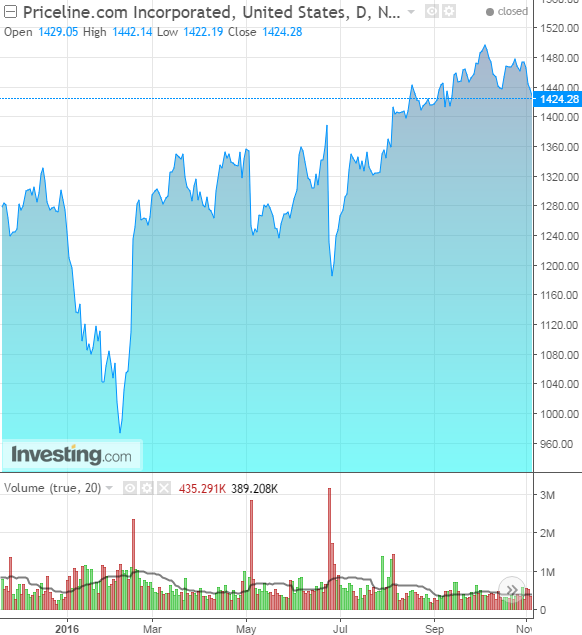by Clement Thibault
The Priceline Group (NASDAQ:PCLN) a provider of travel and restaurant reservations and related services, which offers consumers an array of accommodation reservations through its Booking.com, priceline.com, agoda.com, Kayak, Rentalcars.com and OpenTable brands will release its Q3 2016 earnings report on Monday, November 7, after the closing bell.
1. Earnings and Revenue
Priceline is expected to report earnings of $29.54 per share, on $3.61 billion in revenue, representing 16.5% growth for each measure, since the company's 2015 Q3. After logging 20+% growth during 2014, followed by disappointing single digit growth for full year 2015 (9%), PCLN is back on track to achieve substantial growth this year, of about 15%. The company has registered positive revenue growth during every quarter for the past twelve years; its last negative report dates back to Q3 2004.
Founded in 1997, Priceline almost bit the dust in 2003 after a number of disastrous management decisions including inappropriate line extensions, caused the company to burn through its cash, driving down the stock to a point where management had to implement a reverse 1-for-6 split in order to remain listed. To the company's credit, since the end of 2004 Priceline shares have been on a vigorous, and seemingly endless rally.
2. Management
Too often, management specifics are given short shrift when investors make buying decisions, most likely because researching management can be difficult, and because retail investors often trust the company's board or big activist investors (if there are any). Sometimes, however, the spotlight shines directly on management. Unfortunately, when it does, it's usually not in a positive way. Darren Huston, Priceline Group's CEO since January 2014, was forced to resign this past April, after an internal investigation affirmed that a whistelblower's tip claiming Hudson was having an affair with a female employee was true and violated the company's code of conduct for Priceline executives.
Two months later, Paul Hennessy, then the CEO of the Group's flagship US-based priceline.com brand resigned for professional reasons. During that period, Jeff Boyd, Chairman of the Group stepped in for Hudson, and Brett Keller, Priceline's COO, became the interim CEO in place of Hennessy. While Hennessy's departure wasn't as critical, nor as fraught, and the management situation isn't yet a full blown crisis, investors and would-be investors should follow these changes closely, since new leadership—specifically should someone be brought in from outside the company—may cause disruption in the short term.
3. Operational Results
As mentioned, Priceline has been on a growth streak for almost 12 years now, and its numbers look great. Since the beginning of the year, room nights booked through the Priceline Group's various brands grew 27% to 277 million nights. The company also makes an effort to continually expand its offering, and Booking.com, its most significant brand, crossed the one million listed properties benchmark during this quarter. The company has also seen 9% growth through Rentalcars.com with 34.7 million days worth of car rentals booked since January 2016. Airline tickets are the travel niche where Priceline is weakest. Only priceline.com enables airline bookings (among other things) and the site has seen a decline of 7% in the number of flights booked annually.
From a revenue perspective, while the portion of the business that operates as a reservations agency—such as Booking.com and agoda—is growing, this business brings in only a small percentage fee for each room booked. Priceline sells rooms and flights directly (including via its signature 'Name Your Own Price' service), thus recouping the full transaction fee upon sale. Currently, the agency portion of the business is responsible for 70% of PCLN's total revenue, while the sales portion brings in just 21% of overall revenue and is in decline. However, there's quite a bit of good news as well: the agency segment generates almost three times more revenue than its mercantile counterpart, and is growing four times more quickly, showing 20% growth compared to a 5% decline for the sales business. We see this as the business evolving rather than regressing.
4. Competitive Challenges Ahead
Apart from a global recession which would hurt the travel business alongside the entire economy, Priceline's challenges come from direct competitors, mainly Airbnb the peer-to-peer online short-term rental marketplace and Expedia (NASDAQ:EXPE) which operates Hotels.com and a year ago completed its purchase of Orbitz and HomeAway for $5.5 billion. For now, Priceline remains the leader of this group, and should continue to see ample growth—for as long as people continue to increase the frequency with which they travel.
Conclusion
Although its price of $1445 per share may be intimidating to many, astonishingly, Priceline is not overly expensive relative to its value. Priceline strikes a fine balance between proven, past growth alongside good, still-growing potential. It's a much more mature company than Expedia and trades at an earnings multiple of 27.5, compared to Expedia's 117.
Of course, with a P/E of 27.5 it is still far from being a classic value play. Priceline is adequately priced at the moment and isn't a must-own stock for the future. Still, barring any additional management shakeups, it's a steady, solid company to own or add to your portfolio. We see it as a traditional buy-the-dip play, if the dip moves the stock at least 10% lower, which would bring it below its all-time high.

